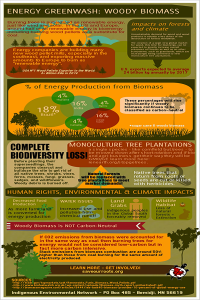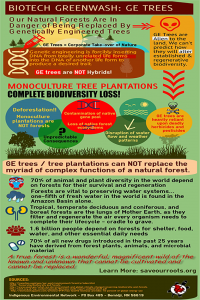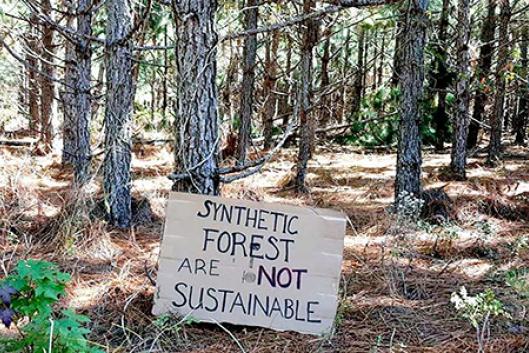By BJ McManama, published on EcoWatch
ArborGen Corporation, a multinational conglomerate and leading supplier of seedlings for commercial forestry applications, has submitted an approval request to the U.S. Department of Agriculture, Animal and Plant Health Inspection Service to deregulate and widely distribute a eucalyptus tree genetically engineered (GE) to be freeze tolerant. This modification will allow this GE variety to be grown in the U.S. Southeast. The reason this non-native and highly invasive tree has been artificially created to grow outside of its tropical environment is to greatly expand production capacity for the highly controversial woody biomass industry.
For almost two decades, and under the radar from widespread awareness and public scrutiny, government, academia, biotech and the commercial forestry industries have invested millions of dollars into research and development (R&D) of GE trees. The few reports published about the R&D cite a major goal of many of these projects as providing a sustainable alternative for fossil fuels in the manufacture of consumer products and energy production.

Eucalyptus Trees are Not Native to North America
Eucalyptus trees grow faster, are highly combustible, and require more water than other species. Although some assurances have been given that this GE variety won't spread unintentionally, there are no guarantees this won't happen. Introduction of non-native, invasive organisms has been proven over the years to cause irreversible harm to the ecosystem they've overtaken. This is true when done either intentionally or accidentally. Some of the non-GE eucalyptus trees, planted in California years ago have proven a huge problem for native species. Efforts to eradicate them have been largely ineffective and are recently the leading cause of wildfires burning hotter and causing more damage in areas where they have grown unchecked.
If the draft environmental impact statement (DEIS) is accepted and this GE tree is deregulated, it will make it possible for these trees to be grown in industrial-sized "tree farms" from South Carolina to Texas.
More than 1 million acres of pine plantations, grasslands, pastures and once forested land could be forever altered by row after row of GE eucalyptus trees. Few other living things can survive on these plantations because all vegetation has been stripped from the land, soaked with herbicides and chemical fertilizers, and planted with row after row with thousands of unnaturally altered seedlings. Every five to seven years the trees are cut like hay and loaded on to giant tractor trailers headed to energy or feedstock processing facilities and the process from start to finish is repeated.

Other Trees in the GE Pipeline
GE eucalyptus trees won't be the only trees modified and mass produced for human demands if we don't stop this emerging biotech takeover of our natural world.
Biotech's R&D divisions and academic researchers have developed poplars and pines to grow faster, produce their own pesticides and be herbicide/pesticide resistant. Other varieties are being designed to have a weaker structure that requires less processing, and conversely some are being modified to have more density/strength for construction applications. For agro-fuel production, tree genes are being manipulated to make them easier to digest into liquid fuels, or for burning as biomass.
Creating trees for commercial applications will, in of itself, create new markets and uses for forest products. Assertions that these synthetic forests will save our precious natural forests is not realistic based on current trends and an ever-growing industry. We only need to look at the expansion of the international wood pellet market to see how demand is increasing.
U.S. southern hardwood forests are disappearing at an alarming rate due to the demand for wood pellets in the UK. Pellet production and export from the U.S. southeast has rapidly increased to keep up with demand. And will these natural forests with 100-year old hardwoods be regenerated? Doubtful, as they will most likely be replaced by mile after mile and row after row of fast growing GE trees.
Precautionary Principle Must Be Implemented
There are far too many unanswered questions regarding the risks associated with releasing millions of GE eucalyptus trees across the U.S. Southeast. Questions regarding invasion of surrounding ecosystems, chemical contamination, water depletion and human rights have to be addressed with certainty. These few questions alone precipitate a complete moratorium on approval of all genetically engineered trees and suspending all field trials until answers can be provided. Native American Tribes and front line communities must be consulted before GE tree plantations are established within their regions. Laws and regulations require agreement by all stakeholders and enforced to ensure protection from aggressive expansion tactics that have and are currently the cause of major human rights violations in developing countries.
As concerned citizens, we must voice our opposition to bio-engineering and commodification of Mother Earth's natural resources. Please tell the USDA that approval for unrestricted planting of this GE eucalyptus must be rejected while considerations are given to all of the threats known and unknown, here.
Indigenous Rights, Forests and Biodiversity
We cannot continue to support an unsustainable natural resource extraction economy that has reduced intact forested areas by an alarming 9.7 percent in the last 15 years. According to data collected, approximately 919 thousand, nearly 1 million acres of forest disappeared between 2000 and 2015. Now, add these latest statistics to millions more acres lost to centuries of clearcutting, that even today, takes place out of public purview.
Non-GE eucalyptus and oil palm tree plantations in the global south have been replacing rainforests at an unbelievably rapid pace. Eucalyptus trees have been the cause of rivers drying up and Indigenous communities losing access to clean water resources along with vital subsistence needs of traditional foods and medicines. Front line and Indigenous communities have been removed from their ancestral homelands to make way for these mega-operations, sometimes violently, and forced into work-camps or relegated to city slums.
The mega-tree farms planned for the southeast U.S. won't be located next to million-dollar homes and corporate high-rises. These most certainly will be placed on or near southeastern Native American treaty and traditional lands, and in close proximity to small communities in rural farming areas. If this happens, the people will be subjected to high concentrations of chemical fertilizers, pesticides and herbicides used for each growing cycle.
Forests are directly responsible for collecting, filtering and directing rainfall to streams, rivers and aquifers. Climate changes have reduced rainfall, and combined with warmer than normal temperatures, groundwater reserves are severely depleted. Recent droughts in the U.S. southeast have caused widespread crop failures and many areas have not yet recovered normal levels. In some areas, what reserves do remain, have shown to contain abnormally high levels of one or more toxic chemicals from industrial agriculture and other polluting industries. If monoculture tree plantation acreage is expanded as planned, human and animal health, and biodiversity will be sacrificed solely to increase corporate profits.
We can't allow the lands and resources of Indigenous and front line communities to be destroyed by large and powerful corporations, as has, and is currently happening in other countries. Click here to sign the petition to request the USDA reject this permit and reevaluate future priorities based on sound science, common sense and preserve these irreplaceable gifts of nature for the next Seven Generations to come.
BJ McManama is an organizer with the Indigenous Environmental Network for their Save Our Roots campaign to stop GE trees and a steering committee member of the International Campaign to Stop GE Trees. She can be reached by email at: saveourroots@ienearth.org.
